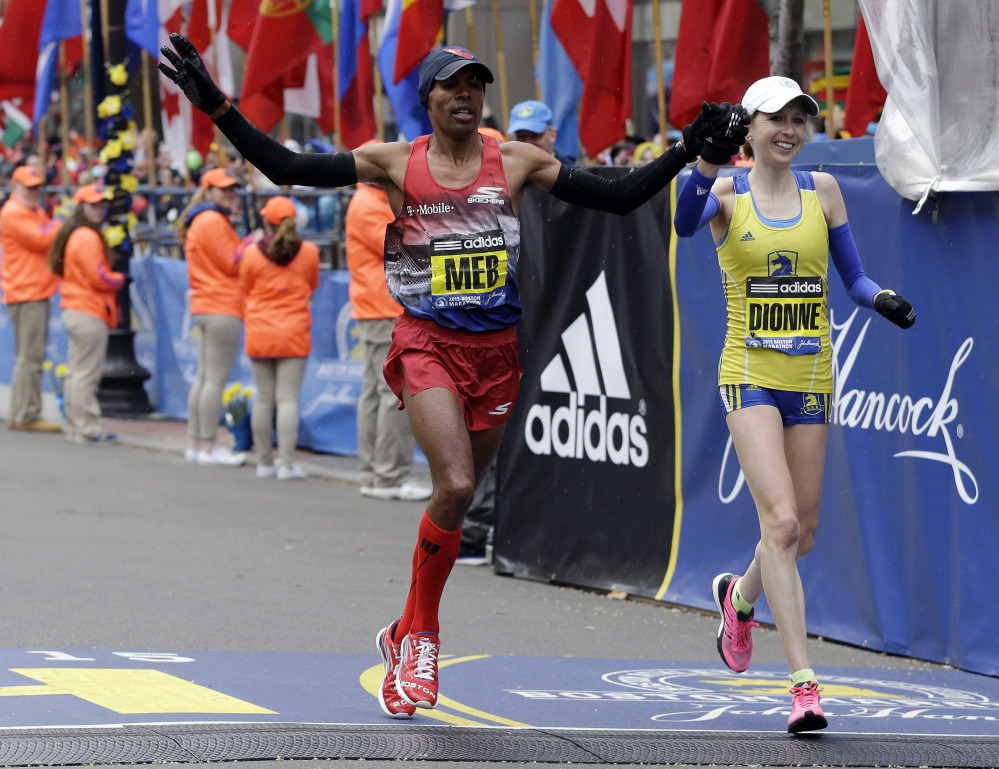BOSTON (AP) — No sport is more connected to Olympic history than the marathon, and no marathon is more iconic than the Boston race that has been testing and torturing distance runners for 119 years.
But when the city submitted its bid to host the 2024 Summer Games, the traditional Boston Marathon course was not part of the plan.
Instead, organizers are suggesting a loop designed to show off the city’s landmarks and conform to the standards of the sport’s international governing body.
To qualify for IAAF certification, a race’s start and finish must be near each other to make sure runners don’t get an advantage from going downhill or having the wind at their backs. Hopkinton and Boston are too far apart to qualify, and the drop in elevation is too large.
USATF and USOC spokespeople referred questions about the potential Olympic course to the IAAF, which did not respond to a call or email seeking comment.
Boston 2024 vice president Erin Murphy said in a statement that bidders are working “to propose a route that highlights Boston’s history, landscape and culture, while conforming to the International Associations of Athletics Federations standards and respecting runner preference.”
“Plans are still in the works and we look forward to continuing the conversation to create a world-class course that will build on Boston’s rich marathon history,” Murphy said.
But the Boston Marathon course is just one of the iconic sporting venues in the city known as the Athens of America that would be left out of an Olympic bid.
The Charles River, home of the annual Head of the Charles Regatta and other rowing races, doesn’t meet the Olympic requirements because the bends and bridges would give some lanes an advantage over others.
And because baseball is no longer an Olympic sport, Fenway Park, the century-old home of the Boston Red Sox, has no part of the venue plan submitted by Boston 2024.
But the Boston Marathon has always had close ties to the Olympics.
The marathon race itself was created to retrace the steps of the Greek messenger Pheidippides, who ran the 25 or so miles from the Battle of Marathon to Athens in 490 B.C. to deliver his message — “Rejoice, we conquer!” — and then dropped dead.
The event was part of the first modern Olympics held in Athens in 1896, and some visiting Bostonians were so impressed that they started one in their hometown.
The Boston Marathon had already grown into a world-class competition by 2013, when the attacks at the finish line galvanized the good feelings surrounding the race.
In fact, the first page of the Boston 2024 bid book is a picture of runners leaving the Boston Marathon start in Hopkinton — a location left out of the bid itself.
Even the IAAF Road Running Manual uses a picture on its front and back covers of the 2011 Boston Marathon — the same race in which Geoffrey Mutai ran what was then the fastest marathon in history.
Inside, though, are the rules disqualifying him from a world record.
“For the Olympic Games, running that race on the traditional Boston Marathon course would generate a lot of attention,” said Tom Grilk, the executive director of the Boston Athletic Association. “It would bring together the history of the Olympic Games and the history of the Boston Marathon.”
The IAAF has made exceptions in the past.
When the Olympics returned to Greece in 2004, the IAAF allowed organizers to borrow from the historic Marathon-to-Athens route. Boston officials said they were told the rules have gotten more rigid since then.
When Boston hosted the women’s Olympic marathon trials in 2008, organizers put together a loop course. But one of the reasons then was to give the athletes a break from the more difficult Boston Marathon course.
“You don’t want to punish the runners right before the Olympics,” Grilk said.
And that may be the biggest problem of all.
It’s not that the wind or downhill portions make the traditional route too easy; the 30,000 runners who made the trip this year already knew that. It’s that the ups and downs hills are so grueling they would prevent Olympians from chasing after fast times.
Ethiopia’s Lelisa Desisa, who won Monday’s race, is not among those scared off.
“For me, I like it,” said the two-time Boston champion, who would be 44 and probably long retired by the time of the 2024 Olympics, anyway. “I like the challenge.”
Send questions/comments to the editors.



Success. Please wait for the page to reload. If the page does not reload within 5 seconds, please refresh the page.
Enter your email and password to access comments.
Hi, to comment on stories you must . This profile is in addition to your subscription and website login.
Already have a commenting profile? .
Invalid username/password.
Please check your email to confirm and complete your registration.
Only subscribers are eligible to post comments. Please subscribe or login first for digital access. Here’s why.
Use the form below to reset your password. When you've submitted your account email, we will send an email with a reset code.